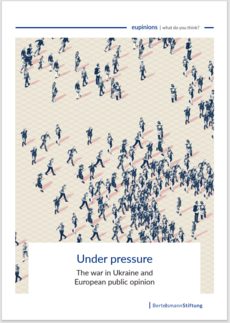72 percent of Europeans are in favor of the EU becoming independent of energy supplies from Russia, even if this means rising costs. Support is highest in Poland (80 percent) and Italy (76 percent). It is among the lowest in Germany, at 69 percent, whose dependence on Russian gas is particularly high. This is one of the findings of the new eupinions survey. eupinions is our European public opinion tool, for which around 12,000 citizens throughout the EU are surveyed every three months. The data is representative for the EU as a whole and for seven selected member states and is published in cooperation with the Belgian King Baudouin Foundation.

© Florian Bayer
Europeans' support for Ukraine continues unabated
Europeans continue to stand firmly by Ukraine's side. A broad majority supports arms deliveries. The willingness to accept Ukraine into the EU remains high. There is also strong support for the need to become more independent in terms of energy supply - even if this means personal cuts. Nevertheless, these attitudes cannot be taken for granted, as there are initial signs that approval is crumbling.
Content
However, the comparative figures from March 2022 show that support for energy independence tends to decline as the scale of the cuts becomes clearer. For the EU, the number of those who want to become independent of Russian energy imports has fallen by only two percentage points. A look at individual member states, however, shows clearer shifts. The decline is most pronounced in the Netherlands (-7 percentage points) and Poland (-6). They are followed by France and Belgium (-5).
The rising cost of living crisis is already a major concern for 44 percent of Europeans. And they will feel the effects of the war even more acutely in their daily lives during the winter season. This will be a stress test for the strong approval that the EU’s Ukraine policy has enjoyed since the war began.
Isabell Hoffmann, eupinions project lead and co-author of the study
Clear majority still in favor of supplying weapons to Ukraine
A clear majority of 60 percent continues to support arms deliveries through the EU to Ukraine. Support is particularly strong in Poland, where 84 percent of respondents are in favor. In Belgium, the figure is 62 percent, and in Germany 61 percent. Only Italy fails to demonstrate a majority in favor of arms deliveries. 58 percent of Italians are opposed. It is striking that the approval ratings for arms deliveries through the EU are continuously higher than those for arms deliveries by the respective home country. Depending on the member state, the difference is between 3 and 7 percent. 16- to 25-year-olds and 56- to 70-year-olds in the EU have a particularly positive attitude toward the supply of weapons. However, approval on this issue also fell slightly between March and June of this year. It fell the most in France (-8 percentage points). "In March, everyone was in shock, and the will to support Ukraine was very high. Three months later, the shock has passed, but the will to support remains high even though the negative consequences are much more evident in everyday life. This perseverance is political capital and should be nurtured," says Isabell Hoffmann.
Another example is the willingness to take in Ukrainian refugees. In March, the overall willingness of Europeans to accept refugees from Ukraine was very high. It still is, with 81 percent in favor. However, this is 5 percentage points less than in March. In France, support has actually fallen by 8 percentage points, in the Netherlands by 7 percentage points and in Poland by 6 percentage points.
Europeans want the EU to play a greater role on the world stage
A similar picture emerges with regard to support for EU enlargement. A clear majority of Europeans are now in favor of admitting Ukraine to the EU (66 percent EU-wide). A look at the different countries, however, highlights significant differences: in Poland, 84 percent are in favor. In Germany and France, the figure is just 60 percent. The majorities are stable, but slightly declining everywhere. There is broad agreement on the question of what role Europe should play in the world. A clear majority of 71 percent says Europe already plays an important role in international affairs, while an even larger majority says Europe should play an even more important role in the future.
Meanwhile, 77 percent of Europeans want the U.S. to be a strong ally at their side. "The EU and its member states have demonstrated unity and the ability to act since Russia's attack on Ukraine and they continue to do so. With time, it becomes increasingly important to carry the public along in terms of argumentation and communication. Our figures show that Europeans continue to support decisive action in support of Ukraine. Having said that, pressures are growing and with them, personal concerns. There is a risk that the desire to help and the private burdens will come into conflict with each other, and that political conflict potential will arise," emphasizes Isabell Hoffmann.
"eupinions" is our European opinion research tool, developed together with Dalia Research. It is used to regularly survey citizens of all EU member states on European issues. The surveys for the present evaluation took place in March and June 2022 throughout the EU and, with a sample size of 11,824 and 11,829 respectively, are representative for the EU as a whole as well as for the seven member States Belgium, France, Germany, Italy, the Netherlands, Poland and Spain. Detailed information on the survey methodology can be found in the publication.
More information: www.eupinions.eu




![[Translate to English:] Menschen, die zum Schutz vor Covid19 eine Makse tragen.](/fileadmin/files/_processed_/c/8/csm_702590682AdobeStock_392991580_KONZERN_ST-CC_46dbe7071e.jpg)


